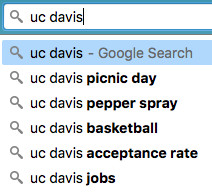When we talk about online reputation, most people, whether they are engaged in digital marketing or not, associate it with social media.
Taking care of the image is related to avoiding criticism and scathing comments on Twitter, Facebook or Instagram. The goal of brands and Community Managers is to respond correctly and quickly to these negative comments.
In terms of online reputation, a more important point is often overlooked in order to get more sales or customers. It is about online reputation, SEO reputation, or — colloquially — what people find when they search for your brand in the world’s most used search engine.

Imagine the following scenario: You google your name or the name of your company and the first result you see is a rant review posted by an unhappy customer. Or perhaps it’s an old news article about a scandal which involves your company. Even worse, someone with a criminal record may share their name with you and make you look bad by association.
There are studies that indicate that over 80% of Internet users search on Google before making a purchase. The searches they carry out are usually ‘brand name’, ‘brand name reviews’, ‘brand name scam’, ‘brand name legit’, among others.
Having a positive set of first-page results when searching for a brand on Google is crucial for digital success… and offline too.
Can a harmful result be deleted from Google?
Google indexes billions of webpages and ranks them hierarchically according to how well they match the intent of the person typing in a search query.
In theory, you can ask Google to stop showing a specific page in its search results. A common case is the dissemination of intimate images without the consent of those involved. But you must mediate a legal claim for Google to decide to take action on the matter. More information about this is available in the content withdrawal policies.
If there is a web page that speaks negative about your brand, then you cannot ask the search engine not to show it anymore. This is simply because the user who wrote their opinion on their blog, social profile or forum, has every right to rant, even if they are not telling the truth.
The strategy: Push negative results to the second page
There is a popular saying in the world of SEO: “The best place to hide a dead body is the second page of the SERPs.” (Search Engine Results Page, a.k.a Google).
We can’t delete negative results, but we can create positive content and try to outrank them. A famous example of this features UC Davis, the college that saw its online reputation sink after a campus officer pepper sprayed students during a protest. Google searches for “UC Davis” were ranking the scandal above their institutional website. The university spent thousands of dollars to try to “hide” the negative search results from Google.

The lesson here is: Pushing content down is almost the same as deleting it from Google because no one reaches the second page when doing a search.
How to hide your name from Google
First of all, make sure that the brand (whether personal or a business) has an official website, if possible an EMD (Exact Match Domain, that is, brandname .com or namesurname .com). It is practically impossible for other sites to rank above the official website if the latter has minimal SEO optimization.
There is another result that will easily be positioned above news, opinions and review pages. These are the official profiles on social networks. These include Facebook, Instagram, Twitter. Other popular options include LinkedIn, Medium, and Academia.edu.
Keep in mind that it is necessary that they have a minimum of content and that they are updated frequently. This will depend on how many negative pieces of content exist and how often they are being updated. After all, improving your reputation on Google is an on-going process, especially if you are competing against active attacks on your brand or name.
Having an official website and optimized social media profiles will take care of the first three or four results on Google and other search engines. Now we need to work on the remaining six or seven results, which is where the negative results will tend to appear.
The easiest and fastest way to create content that positions quickly is to hire sponsored articles in newspapers or large digital media, ideally from the same country where your audience is searching for you.
Newspapers have a lot of authority in the eyes of Google and rank easily. In turn, by being published in the mainstream media, they have credibility with the user doing the search.
While this strategy comes at a cost (newspaper advertisements are not cheap), it is highly effective.
The complexity of the task of cleaning the reputation on Google depends on what type of results are the negative ones. If it comes to comments in small forums or blogs, there will be no problem. On the other hand, if a website with a lot of authority is the one that hosts the criticism, it will be more difficult to generate content that can overcome it and take it to the second page.
If we are faced with more authoritative websites, to overcome them we must have more extensive content. In turn, we can create quality backlinks targeting positive articles, to enhance their organic positioning. All of this will add to the cost of the strategy, but a negative reputation is always costlier.
In Conclusion
Everything mentioned in these lines is in the context of isolated negative results.
In the case of a company with clear accusations of fraud for defrauding its customers, there is not much that can be done. The same in the case of a person who is accused or tried for a crime with high media coverage. Those of us who are dedicated to search engine optimization work with an algorithm (Google’s) that does not do what we want. We ‘help’ you to find and rank a website more easily above your competition, but we cannot go against a whole tide of negative results.
I want you to visit Google right now and search for your brand, be it a business or your own name. That’s what people find when searching for you. Do you like what you see on the first page? If you don’t like what you are seeing, you should apply the advice in this article, or get in touch for an SEO reputation consultation.





